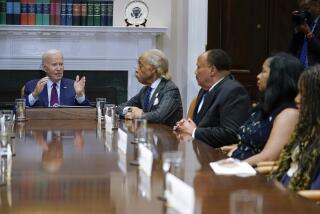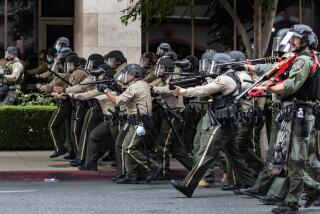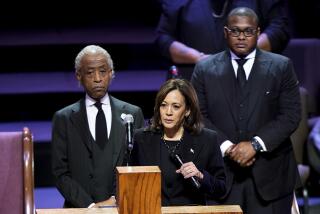Obama mourns slain Dallas officers: They ‘shared a commitment to something larger than themselves’

President Obama eulogizes five slain police officers at an interfaith memorial service in Dallas.
- Share via
Reporting from Dallas — President Obama urged activists and police to set aside their differences and acknowledge one another’s humanity as he presided over a memorial Tuesday for the officers slain last week in Dallas and tried to navigate an America deeply divided and in mourning after a week of violence.
Seeking to be heard himself by two groups who have dismissed him — activists and law enforcement groups alike have complained he ignores their demands — Obama called on police to acknowledge institutional racial bias but also condemned the killing of the white officers by a black gunman as an act of “racial hatred.”
“I’m here to insist that we are not as divided as we seem,” Obama told the crowd of law enforcement and family members grieving the five officers killed Thursday during a protest of police killings of black men elsewhere. “And I know that because I know America. I know how far we’ve come against impossible odds.”
He pointed to the officers on duty, who rushed to shield demonstrators protesting their very careers.
“Despite the fact that police conduct was the subject of the protest, despite the fact there must’ve been signs or slogans or chants with which they profoundly disagreed, these men and this department did their jobs like the professionals that they were,” he said.
The task before Obama in Dallas was one of the most difficult he has faced in speaking out on racial conflict and criminal justice. Though it wasn’t the first time he has asked the public to honor the sacrifices of law enforcement and join calls from activists for police fairness, never has he faced such a pressing need to do both at the same time.
Even as he appeared in Dallas, activists complained that he hasn’t visited Baton Rouge, La., or Falcon Heights, Minn., the sites of the shooting deaths of black men by white officers that prompted Thursday’s march in Dallas.
At the same time, some police blamed Obama’s empathy for the Black Lives Matter movement for creating an environment where the Dallas attack occurred.
Obama sought to find common ground, lauding police as he has several times in recent days.
“So much of the tensions between police departments and minority communities that they serve is because we ask the police to do too much and we ask too little of ourselves,” he said, quoting Dallas Police Chief David Brown, who spoke earlier at the service.
The crowd’s response to Obama alternated between sitting stone-faced and at times standing and applauding.
Against that complicated backdrop, Obama was joined by a coalition of black and white officials, including prominent Republicans and Democrats.
Former President George W. Bush, wife Laura and Texas Sens. John Cornyn and Ted Cruz, all Republicans, sat interspersed with the Obamas and Vice President Joe Biden and his wife, Jill. Brown, the black chief, sat with Dallas’ white mayor, Mike Rawlings.
Bush challenged the idea that the forces pulling Americans apart are stronger than the forces pulling them together.
“At our best, we practice empathy,” he said. “This is the bridge across our nation’s deepest divisions.”
But the more empathy Obama shows to either side, the more criticism he draws for undercutting the other.
Obama’s visit to Dallas suggests that the president sees an “equivalency” between what black and white America are experiencing after last week, said Princeton University professor Eddie Glaude Jr.
“He sounds like he’s trying to convince white people of the fact that black people are mourning and grieving, as opposed to speaking directly to black people,” Glaude, chairman of the Center for African American Studies at Princeton, said on MSNBC before Obama spoke.
The president also had met a day earlier with law enforcement officials strongly critical of his rhetoric in moments of racially charged conflicts between police and young black men.
James Pasco, executive director of the Fraternal Order of Police, said he told the president that it often appeared to him that Obama would give one speech to minority communities and another to law enforcement.
“I said we wanted to see him give one more-unifying speech, which addressed, to the satisfaction of all, the grievances and the grief of all parties,” he said.
Obama repeatedly offered to provide transcripts of public comments he has made in support of law enforcement, according to Mike Chapman, the elected sheriff of Loudoun County, Va., who represented the Major Counties Sheriffs’ Assn. The offer was emblematic of what Chapman called a “frank” two-hour discussion in which Obama often seemed on the defensive.
“‘Maybe you’re hearing it differently,’” Pasco quoted Obama as saying.
Indeed, Obama publicly indicated Tuesday that he has grappled with the limits of his ability to change perceptions: “I’ve seen how inadequate my own words have been.”
Nonetheless, he tried to reach several audiences at once.
“Even those who dislike the phrase ‘black lives matter,’ surely, we should be able to hear the pain of Alton Sterling’s family,” Obama said, addressing the law enforcement community at large.
“Protesters, you know it, you know how dangerous some of the communities where these police officers serve are,” he added, admonishing activists. “And you pretend as if there’s no context.”
“America, we know that bias remains,” he said to his larger audience. “… We’ve heard it at times in our own homes. If we’re honest, perhaps we’ve heard prejudice in our own heads and felt it in our own hearts.”
If Americans don’t confront such shortcomings, Obama warned, “not just in the comfort of our own circles, but with those who look different than us or bring a different perspective, then we will never break this dangerous cycle.”
Terry Cunningham, president of the International Assn. of Chiefs of Police, attended Tuesday’s event and was also at the meeting Monday at the White House. He wished Obama had not mentioned Philando Castile or Alton Sterling on Tuesday, and instead kept the focus on police.
“We talked to him about that: When police officers get killed, you’re not calling them. There’s got to be a balance there,” Cunningham said, noting that while Obama met with relatives of the fallen officers in Dallas, and sends letters to families of others killed, “he calls the families of Sterling and Castile,” Cunningham said as he left after the speech, wearing his dress uniform.
Times staff writers Molly Hennessy-Fiske in Dallas and Michael A. Memoli in Washington contributed to this report.
UPDATES:
3:33 p.m.: The story was updated throughout.
12:14 p.m.: The story was updated with President Obama’s comments.
10:41 a.m.: The story was updated with President Obama calling the families of the two black men shot to death by police last week.
6:54 a.m.: The story was updated with comments from attendees of a vigil in Dallas.
The story was originally published at 3 a.m.
More to Read
Sign up for Essential California
The most important California stories and recommendations in your inbox every morning.
You may occasionally receive promotional content from the Los Angeles Times.











